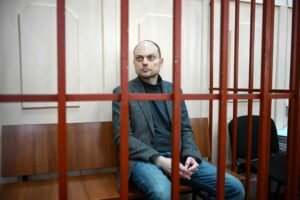Vladimir Kara-Murza was sentenced to 25 years in prison by a Moscow court on April 17.
Kara-Murza’s lengthy sentence, to be served in a strict Russian penal colony, was a shock but not a surprise. He has been jailed since April 2022 when he was picked up on lesser charges. He was charged with treason in October 2022 for public remarks criticizing the Kremlin’s war in Ukraine and the return of Soviet-style repression in Russia.

Read the full story
What explains this harsh sentence which a prominent human rights lawyer called “unprecedented” and Kara-Murza’s mother called Kafkaesque? The answer is that Kara-Murza is an effective opponent of the Putin regime, especially abroad.
First, Kara-Murza helped bring about a new American law creating “Magnitsky” sanctions against Russian government officials responsible for human rights abuses and corruption. The sanctions are named for Sergei Magnitsky, a Russian lawyer abused to death in jail for standing up to official corruption. These sanctions filled the vacuum that existed in U.S. policy since Washington stopped conditioning trade privileges on human rights performance in 2000. Magnitsky sanctions impose financial and travel penalties on individuals responsible for corruption and rights abuses, including many Russian officials and elites who stash their wealth, vacation, or send their children abroad for school. The presiding judge in Kara-Murza’s trial and the warden of his prison are among those sanctioned.
Second, Kara-Murza has been a staunch and consistent opponent of Putin’s war in Ukraine since it began in Ukraine’s east in 2014, and since Putin launched a comprehensive invasion in 2022. Kara-Murza recognizes Putin’s aggression as a pretext for destroying civil society and political opposition inside Russia and to prevent a successful democracy from taking root in a neighboring country. He articulately punctures the myths that Putin pedals: that Russia was provoked, Ukraine is ruled by “Nazis,” Ukraine has always been and should be Russian, and above all, all Russians support the war.
Even before receiving the 25-year sentence, Kara-Murza paid a terrible price for opposing Putin. He survived poisoning attempts with a nerve agent in 2015 and 2017 that have been linked to the regime. The investigative journalism outfit Bellingcat reported that on both occasions, Kara-Murza was followed closely by a poisoning unit operated by the Russian Federal Security Service, the FSB. The same unit trailed the anti-corruption activist Aleksei Navalny before he fell critically ill. Navalny is now reportedly seriously ill in a penal colony.
Kara-Murza’s health is also deteriorating. The nerve damage he suffered is spreading. His lawyer, Vadim Prokhorov, said on Monday that Kara-Murza’s condition, polyneuropathy, is recognized as incompatible with incarceration under Russian law. Prokhorov continues to advocate for Kara-Murza despite being forced out of Russia recently under threat of criminal prosecution.
“I’m in jail for my political views,” said Kara-Murza in his final statement to the court. “For speaking out against the war in Ukraine. For many years of struggle against Vladimir Putin’s dictatorship. For facilitating the adoption of personal international sanctions under the Magnitsky Act against human rights violators. Not only do I not repent of any of this, I am proud of it.”
As he should be. Kara-Murza is a proud Russian and a democracy activist seeking to carry on the legacy of his Soviet dissident forbears – including his father. However, having acquired British citizenship more than 20 years ago while studying at Cambridge University, he is entitled to support and diplomatic efforts by the U.K. He is a permanent resident of the U.S. whose wife, Evgenia, and children are American citizens. President Biden has made the struggle between democracy and authoritarianism a top priority of his administration. Above all, the U.S. should devote itself to securing Kara-Murza’s freedom, because supporting individuals working for democracy is in the best interests of the United States.



